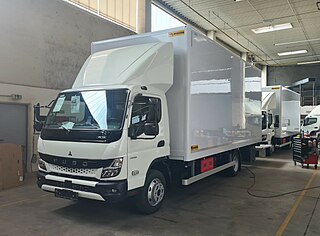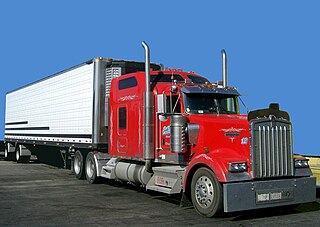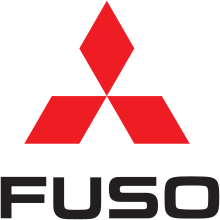
The Mitsubishi Fuso Truck and Bus Corporation is a Japanese manufacturer of trucks and buses. It is headquartered in Kawasaki, Kanagawa and owned by Germany-based Daimler Truck.

Kenworth Truck Company is an American truck manufacturer. Founded in 1923 as the successor to Gersix Motor Company, Kenworth specializes in production of heavy-duty and medium-duty commercial vehicles. Headquartered in the Seattle suburb of Kirkland, Washington, Kenworth has been a wholly owned subsidiary of PACCAR since 1945, operating alongside sister company Peterbilt Motors.

Peterbilt Motors Company is an American truck manufacturer. Established in 1939 from the acquisition of Fageol Truck and Motor Company, Peterbilt specializes in the production of heavy-duty and medium-duty commercial vehicles. The namesake of company founder T. A. "Al" Peterman, Peterbilt has operated as part of PACCAR since 1958, operating alongside sister division Kenworth Truck Company.

Sterling Trucks Corporation was an American truck manufacturer. Founded in 1998, Sterling was created following the 1997 acquisition of the heavy-truck product lines of Ford Motor Company by Freightliner. Taking its nameplate from a long-defunct truck manufacturer, Sterling was slotted between Freightliner and Western Star within the Daimler product range.

UD Trucks Corporation is a Japanese company whose principal business is the manufacturing and sales of diesel trucks, buses, bus chassis and special-purpose vehicles. Its headquarters are located in Ageo, Saitama, Japan. The company is a wholly owned subsidiary of Isuzu since 2021. Until 2010, the company was known as Nissan Diesel.

The Nissan Caravan is a light commercial van designed for use as a fleet vehicle or cargo van and manufactured by Nissan since 1973. Between 1976 and 1997, a rebadged version of the Caravan sold as the Nissan Homy, which was introduced as an independent model in 1965. Outside Japan, the Caravan was also sold as either the Nissan Urvan or Nissan King Van, or earlier with Datsun badging.

The Mitsubishi Fuso Canter is a line of light-duty commercial vehicles manufactured by Mitsubishi Fuso Truck and Bus Corporation, part of Daimler Truck, subsidiary of Mercedes-Benz Group. The Canter is manufactured since 1963, now in its eighth generation. The Canter is named after the English word describing the gait of a horse, emphasising the 'thoroughbred' nature of Mitsubishi trucks.

The Mitsubishi Fuso Fighter is a line of medium-duty/heavy-duty commercial vehicle produced by Mitsubishi Fuso Truck and Bus Corporation. The range was primarily available in other big-size and mid-size trucks.

Cab-over, also known as cab over engine (COE), cab forward or flat face (U.S.), flat nose (Canada), or forward control (UK), is a body style of truck, bus, or van that has a vertical front, "flat face" or a semi-hood, with the cab of the truck sitting above the front axle. This contrasts with a conventional truck where the engine is mounted in front of the driver.

The Isuzu Elf is a medium duty truck produced by Isuzu since 1959. Outside Japan it is known as N series and Q Series. The range was originally mainly available in Japan and other Asian countries. Australia was another important market for the Elf and N series – to the extent that it was manufactured there from the 1970s using many local components. Since the early 1980s, it has also been sold and built in the United States, and also as the Isuzu N-Series. Only North America receives the wide-cab version.

The Isuzu Forward is a line of medium-duty commercial vehicles manufactured by Isuzu since 1970, following the earlier TY model which occupied the same slot in the market. All F-series trucks are cab over designs and the cabin comes fully built from the factory. Most models come with a diesel engine; but, some markets get CNG derivatives as well. The F-series is available a variety of cab styles, engines, 4WD or 2WD depending on the market it is sold. While Isuzu's main plant is in Japan, these trucks are locally assembled from CKD kits in numerous countries.

The UD Condor (kana:UD・コンドル) is a line of cabover medium-duty commercial vehicles produced by Nissan Diesel introduced in 1975, Compact models sold under the Nissan Diesel Condor brand and rebranded Nissan Atlas.

The Hino Ranger is a medium or heavy duty commercial truck produced by Hino Motors since 1964. In the domestic market, its principal competitors are Isuzu Forward, Nissan Diesel/UD Condor and Mitsubishi Fuso Fighter.
The Mitsubishi Fuso Canter Eco Hybrid is a hybrid diesel-electric commercial truck made and sold by the Mitsubishi Fuso Truck and Bus Corporation in Japan. The vehicle is being produced at the company’s Kawasaki Manufacturing Plant, in Kawasaki City, Kanagawa Prefecture, Japan.
Truck classifications are typically based upon the maximum loaded weight of the truck, typically using the gross vehicle weight rating (GVWR) and sometimes also the gross trailer weight rating (GTWR), and can vary among jurisdictions.

The Ford L-series is a range of commercial trucks that were assembled and marketed by Ford between 1970 and 1998. The first dedicated Class 8 conventional truck developed by the company, the L-Series was colloquially named the "Louisville Line", denoting the Kentucky Truck Plant that assembled the trucks. The successor to the Ford N-series and the Ford F-900/1000 Super Duty, the line was a Class 6-8 truck. Slotted above the medium-duty F-Series, the L-Series was produced over a wide variety of applications through its production life, including both straight trucks and semitractors.

The Peterbilt 379 is a model line of Class 8 trucks that was produced by the Peterbilt division of PACCAR from 1987 to 2007. Serving as the successor to the 359, the 379 was a conventional-cab truck configured primarily for highway use, serving as the flagship of the Peterbilt model line. During much of its production, the 379 was popular among owner-operator drivers. In line with the Kenworth W900, the 379 serves as a popular basis for truck customization.

The Kenworth W900 is a model line of conventional-cab trucks that are produced by the Kenworth division of PACCAR. The replacement of the 900-series conventional, the W900 is produced as a Class 8 conventional-cab truck primarily for highway use. The "W" in its model designation denotes Worthington, one of the two founders of Kenworth. 63 years after its introduction, the W900 is currently in its third distinct generation.

A hybrid electric truck is a form of truck that uses hybrid electric vehicle (HEV) technology for propulsion, instead of using only a combustion engine.

















